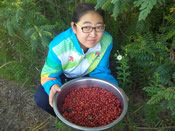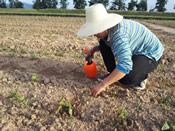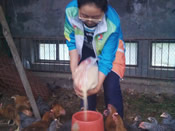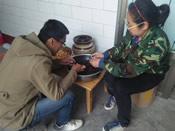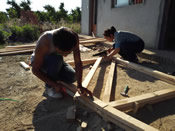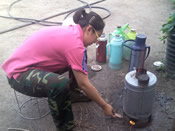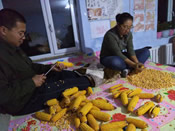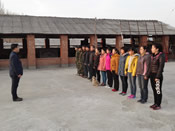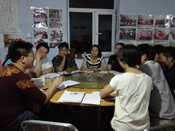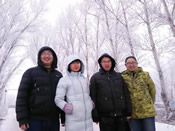
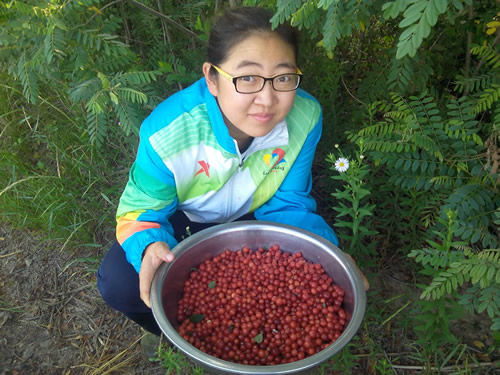 |
| Song Wei picking wild cherries in the field to make enzymes. (Meilu, intern in rural reconstruction) |
Song Wei (Intern of Youth Internship Programme on Rural Reconstruction, 2015-2016, supported by PCD)
|
Editor's note: If human beings want to continue to survive, a fundamental and sustainable approach is to return to the land and granting agriculture its due respect. However, rural communities, farmers and agriculture face difficulties caused by modernisation and globalisation. They are being uprooted in the same way a big tree is cut off from its roots while its flowers and leaves are preserved. How could one expect the tree to continue to live? For human beings, it is a road to self-destruction. Sustainable agriculture and rural reconstruction are PCD’s two main programmes. For years, we have been supporting initiatives to bring young people to work in ecological farms so that they have a chance to leave their ivory towers and support farmers in organising cooperatives and engaging in ecological agriculture. This way, young people get to learn about and take an interest in people from China’s bottom social strata. It is also a form of training and a process of growth for young people. The most recent rural reconstruction internship programme supported by PCD lasted from August, 2015 to July, 2016. Our partner, Liang Shuming Rural Reconstruction Centre, recruited 13 young people who were dispatched to the rural community of Pohan in Yongji of Shanxi Province and Yunfeng Agriculture and Animal Husbandry Cooperative in Changchun of Jilin Province as interns to learn integrated rural community development and ecological agricultural skills and to reflect on the approach of sustainable development concerning mutual support between urban and rural communities. Song Wei, 24, comes from Dalian City of Liaoning Province. Even though she was born in the city, her passion for biology and botany, interest in the three rural issues in China (agriculture, farmers and rural communities) and her dream of an equal society led her to study agriculture in university and take part in research and survey, voluntary teaching and cultural activities in rural areas. She was an intern in rural reconstruction hosted by the two cooperatives mentioned above while also in the Green Ground Union in Beijing. During her internship, she learnt how to rear pigs ecologically, make enzymes and natural fertilizers, to run a farm, build pigsties, market ecological agricultural products, conduct educational and promotional programmes and document their work and activities. Here Song Wei reflects on her internship in rural reconstruction. In mainstream society, where most people strive for wealth and social status, Song Wei chose to go against the norm and joined other young people who wanted to prove themselves by taking part in rural reconstruction. In this article, she reflects on the future of China’s rural development from an intellectual perspective. Towards the end of the article are Song Wei’s personal notes, made at PCD’s request. |
As human beings, wanting to realise our self-worth is an instinct. During the time I took part in the training on rural reconstruction and even over the last few years, I have been searching for ways to realise my own worth, a goal which will continue into the future.
During my one-year internship in rural reconstruction, working with the land and crops was a practice in patience and something which touched and moved me. Plants grow slowly, but also quickly: when they are tender and small, no matter how impatient you are, you cannot harvest them; but when they are ripe, you regret not having taken better care of them- you could have harvested bigger and better fruits! Whether it is cultivating crops or rearing animals, human beings use their intelligence to reap food and other resources from nature to satisfy their own needs in terms of clothing, food, shelter and transportation. In this game, every experience concluded by our ancestors and every skill that was developed brings us joy and happiness. From something as simple as tilling the land, sowing seeds and feeding animals to preventing diseases and pests, building sheds and pens, processing agricultural products, we learn to build trust among ourselves and to cooperate.
During the one-year internship, whether it was at Yunfeng in Changchun, Yongji at Shanxi or Green Ground Union in Beijing, I always had the opportunity to meet people from different backgrounds and with different personalities. Many people achieved their small successes by tirelessly and conscientiously learning and working in their professional fields or hobbies. In the field of rural reconstruction, things are not done by one person in a day. Many people have spent their whole lives working in this field, but there is still so much to do. With this in mind, I knew I must focus, learn and train myself, starting with the fundamentals. Liu Laoshi, veteran advocate and practitioner in rural reconstruction in mainland China, advocated five pin ming (literally, to fight with one’s life) — to do one’s utmost in one’s study, practice, reflection, in being healthy and standing with good people. What he advocated was exactly the attitude and quality that we, the passionate youth, must assume.
Nowadays, there is no lack of either resources or platforms in the field of rural reconstruction. After learning about the relationship between human beings, nature and society, we have to address the question of self-knowledge and what we choose to do. Many of my classmates envy my freedom. Since I work in the field of rural reconstruction, my lifestyle is different from those who work in mainstream society and who feel that they are under a lot of constraints. I am free to practice what I believe in and what I want to do. Some teachers praise me for giving up mainstream jobs to pursue my dream of starting my own venture. However, I think we must always ask ourselves: whether for the collective or for the individual, where does the path of engaging in rural reconstruction, or agriculture, lead? I think that current approaches in rural reconstruction can be divided into the following types:
- Promoting farming and community development by building farmers’ organisations: including credit cooperatives, purchase and marketing cooperatives, ecological farming and animal rearing, integrated social services such as children’s education and elderly care. These types of organisational services are usually led by local leaders and gained initial success only after at least 10 years of training, growth and development. Even though it takes a long time, any success is significant for the local community and society as a whole.
- Exploring and producing ecological agricultural products: current initiatives mostly focus on one or a few products, such as ecological rice, tofu, stone-ground wheat flour, etc. These types of initiatives can be launched locally with or without external support. The cycle of production is short and output is fast, but there is a danger of farmers simply becoming tools catering to the needs of the agricultural industry.
- Preserving and developing traditional health products: such as wild honey, homemade brown sugar and home-brewed vinegar. Traditional health products have a high cultural value but must be made with reliable products and methods.
- Organising producers and building platforms for sale of products: a stable sales platform is very important for young people returning to their home villages to farm for a living because most of them lack the necessary capital and resources.
- Supporting farmers as consumers and looking for good agricultural products: consumers’ organisations and their demands have a strong and immediate impact on the producers because demand engenders production.
- Developing tertiary agriculture (i.e. developing agriculture as a tertiary industry): to tap into the cultural meaning of agriculture by renovating old farm houses and conducting rural study tours so that people can experience the power of nature in rural areas and gain understanding and insights during their stay. This approach is gaining popularity and is very flexible.
- Young people engaged in rural reconstruction have been brought together to explore the future of the path they have chosen. By gaining from and giving support to each other, they can tread the path with stability.
There are of course other ways of conducting rural reconstruction. In Yongji, Brother Shaoxiong, a core member of Puhan Youth Green Commune, has been supporting young people in their learning and training. Han Ye has been using his architectural expertise to help design and build ecological houses in rural areas. Liu Pei engages in diverse training initiatives for young people and cooperatives. Prof. Zhang Xiaode conducts economic research in tertiary and research institutions.
No matter which approaches have been adopted, those concerned with rural reconstruction are exploring, practicing and promoting a form of development that is a sustainable, more harmonious and balanced way of life. In today’s world where capital dominates all aspects of life, how do we preserve the most tender part of our inner being that wants a way of life that is pure and genuine? For me, someone who is lacking in knowledge, I can only express my thought by using affected literary language. What I am most concerned with about myself and society is how human beings truly become human, be it now, or in the future.
“No matter what changes there are in the external conditions or in the things that you are doing, what is most important for you and your team is to maintain your independence. Whether you work with this team or not, you must know what you want to do and focus on preserving what you have learnt and let it anchor you. Only by strengthening yourself and letting yourself grow can your team gain a footing in this society. Do not rely on external support.”
These are words written for me by a friend. Deep down, I know disciplined learning and studying is the path to achieving a breakthrough in self-actualisation. Whether in terms of team management, sorting out theories or learning agricultural skills and adopting humanistic convictions, all these involve team development driven by personal growth, and the values derived are self-evident. Now my stage of simple learning has ended. The road ahead is very long and personal growth is a life-long task. I believe that by continuing to accumulate, reflect and summarise experiences and to practice what one has learnt, so long as one is hardworking, one’s fortune will not be too bad.
I have been fortunate enough to have the support and company of the Changchun team and the guidance and care of the Yongji team. My friends in the students’ society at university have also given me support and encouragement, and my beloved has given me guidance and shown me tolerance. Here is my wish: that my initial good will brings friendship and love; and that there be songs on the road ahead.
I only feel that life is too short!
The plan for further training in rural reconstruction that I set for myself has only just begun.
Epilogue: At the request of PCD, Song Wei has written the following notes reflecting on her thoughts.
Why is the internship programme in rural reconstruction a way to search for “self-worth”?
The internship programme in rural reconstruction was a chance for me to become engaged in initiatives to sort out macro-theories and to come into contact with numerous rural reconstruction initiatives and with people in their everyday life. This was an incredibly valuable opportunity for me to get to know the world, society and myself. I think that I am going to dedicate half, or even more, of my lifetime to rural communities. Therefore, I must search for my own worth and find ways of self-actualisation in this context. My participation in the internship programme was a process to answer the question of who I am and where I am going.
My own worth depends on how I am to make the best use of my capability in an appropriate post, to be a solid cog. However, I need to find out which post is right for me, a cog, and how I can learn more about society—the big machine—and how to serve it.
For me, what is the meaning and the purpose of rural reconstruction initiatives?
Rural reconstruction tackles the dual structure of the urban and the rural area and addresses the social crisis engendered by it. By organising small-scale farmers and uniting them, rural reconstruction initiatives allow farmers to be heard and improve their lives and statuses. As awareness is raised, they know their rights and how they may fight for them. As young people become aware of the problems of mainstream western mentalities, such as excessive liberalism and individualism, they may choose the right path for their life, and allow more people to live with dignity.
Personally, taking part in rural reconstruction gave me the opportunity to meet many like-minded people and made it easier for me to understand society more thoroughly and to gain true knowledge.
Translator: Cheung Choi-wan
English Editor: Dominique Hua


